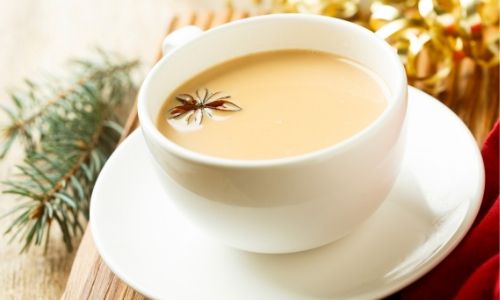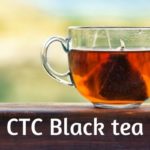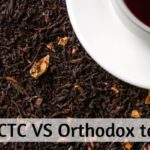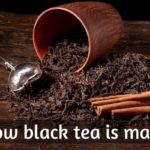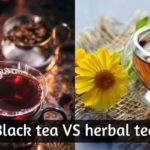Milk powder tea might not sound amazing, but it's actually even better than the traditional milk tea, in my humble opinion. Sometimes you just run out of milk, or the milk goes bad, and you're only left with powdered milk.
No worries, you can still make milk tea. Only now it'll be milk powder tea. And it's going to be so. much. better.
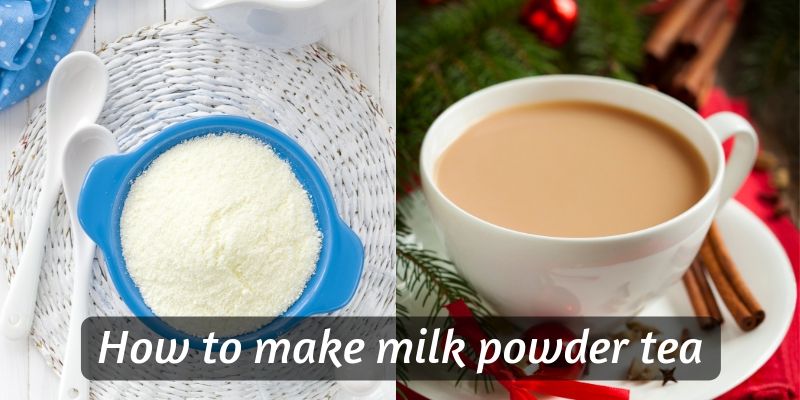
Table of Contents
What is milk powder tea ?
Milk powder tea is made by mixing brewed tea (almost always black tea) with milk powder. This is usually done when you've run out of milk, however there are folks who simply prefer the extra milky flavor of powdered milk over real milk.
Which is why milk powder tea has become a thing.
In short, milk powder tea is nothing more than tea with milk powder. There are some steps you have to be specific about, otherwise it'll come out just meh, instead of impressive.
I'm going to help you out, so get your tea ready !
How to make tea with milk powder
You're going to find this process fairly easy, but there are some details you're going to have to watch out for.
One of them being when and how to add the milk powder, but I'm going to guide you through that.
First off, let's go through the ingredient and utensil list. This is for 8 oz/236 ml of milk powder tea, and you'll need:
- brewed tea of your choice, either loose leaf or teabag
- milk powder of your choice, any will do
- (optional) hot water to mix the milk
- (optional) sugar or any sweetener you like
And that's pretty much it, you'll notice it's the method that matters more, rather than the ingredients. Let's start with the tea first.
1. Brew your cup of tea
Brewing your tea should be easy enough. If you're using teabags then follow the instructions on the tea pack, only add a little less water than they specify.
The milk will take out a bit of the tea's strength, so you need to brew your tea extra strong.
If you're brewing with loose leaves (better option for flavor) then make sure you only let your leaves steep for 3 minutes if using black tea.
You can make milk tea with rooibos tea, but that can and should steep about 5 full minutes.
Whichever way you do it, brew your tea as usual, just make sure you add a little less water. If you want to add a lot of milk powder, then add even less water to your tea.
Once your milk is done brewing, strain the teabag or leaves out of the tea and set the drink aside.
2. Mix the powdered milk (2 options)
Now it's time to mix in the milk. You can do this two ways, depending on how milky you want your drink, and how strong a cup of tea you want.
If you want very milky, creamy tea, then mix the milk directly into the tea.
If you want just some milk in your tea, mix the milk with hot water and then with the tea.
Assuming you're going with the extra milky, creamy option ( I would), let's start guiding you through that.
In a cup, the actual cup your going to drink your tea from, add in as much milk powder as you would like. Now, if you're using a basic 8 oz/236 ml cup then you'll want at least 2 heaping teaspoons of milk powder. This is extra milky, remember.
To that you will add a few teaspoon of brewed tea from the other teacup. This is so the milk forms a thick paste at first. the water and heat will help dissolve it into a more liquid version.
Add more and more tea to the paste, slowly. Keep stirring and smushing the paste with the back of your teaspoon, until it's all evenly dissolved and there are no lumps left.
Keep adding tea until you've poured all of it into the cup with powdered milk.If you've kept stirring then by now you should have a very pale cup of tea, and a very milky scent and flavor in the kitchen.
Now let's help you out if you'd like a little less milk. You will need to add maybe less milk, as in just one heaping teaspoon to the empty cup, and hen add a few teaspoons of hot water.
You will form the same paste as above, and keep adding hot water until the milk has dissolved completely (about 2 oz/66 ml or less). Then, into the milk mixture add your tea, stir, and enjoy.
3. Enjoy !
Whether you've made the extra milky version or the more toned down milk powder tea, you're bound to love it. If you want to add any sugar or honey, now is the time since the tea is still hot and will dissolve it nicely.
A word on mixing the milk and the tea: make sure your pour the tea into the milk. This is because the tea blends into the milk better than the milk blends into the tea. And you will notice this when tasting the tea.
If you're planning on making milk powder tea for several people (like a tea party) then the recipe is the same, except you will need to make your tea in a larger batch.
Here I've provided instructions for brewing an 8 oz cup of milk tea. If you're making a big teapot, you'll want to make about 6-8 times more milk tea than this.
Can you put any powdered milk in tea ?
Yes, any powdered milk will work for milk tea. The best flavor comes from milk powders that are slightly thick.
Try and look for those, and steer clear of creamers. While creamers are delicious, and most often vegan, they don't help with the texture of milk powder tea. They dissolve very quickly and almost too well.
This is a tea that ends up a bit thicker than regular tea, so using creamer isn't the best option.
Can I use milk instead of milk powder ?
Yes, you can use milk instead of milk powder. In fact milk powder tea is the option you're left with if you ever run out of milk or your milk goes bad.
Do keep in mind that if you're using actual, liquid milk you'll want to heat the milk first, and pour the tea into the milk. This is the same reason I described above: the tea blends much better into the milk, than the other way around.
And just for kicks, you can use milk and milk powder in your milk tea. Although I guess at this point it's just flavored milk.
Conclusion
Milk powder tea sounds like a very sad drink, but it's really much more delicious than regular milk tea. It's the concentrated milk flavor in milk powder that gives it that lovely aroma, and you'll want o make this quite often once you've had your first sip.
Remember, add the tea to the milk, not the other way around !
If you want to know more about coffee or tea, feel free to check the related articles below. Who knows what else you might find ?

